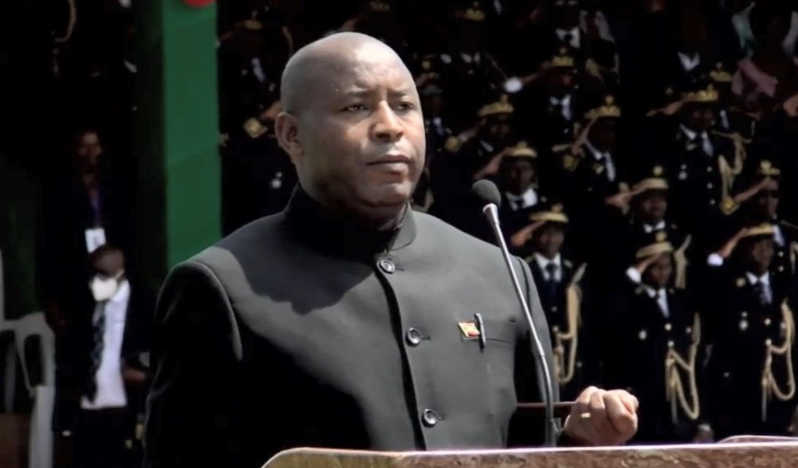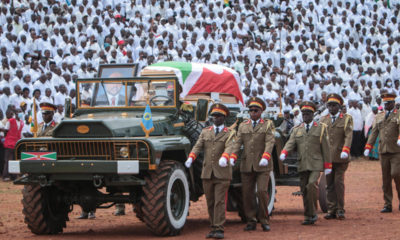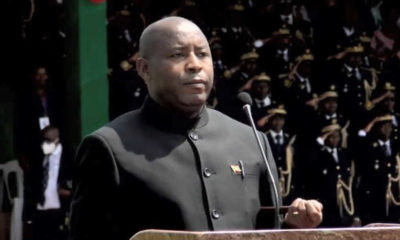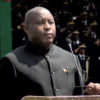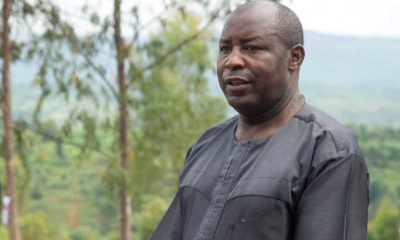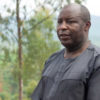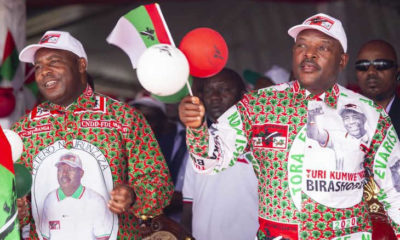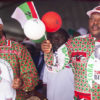News
Ndayishimiye to follow in predecessor’s footsteps
On June 18, 2020, a week since the passing of President Pierre Nkurunziza, Evariste Ndayishimiye, the man who won the May 20, 2020 elections in Burundi, was sworn-in as the new president of Burundi.
No foreign heads of state were present when Evariste Ndayishimiye took oath in the Burundi’s political capital Gitega.
Despite rumours that Pierre Nkurunziza succumbed to Covid-19 spreading like wild fire in Burundi and beyond, people who attended Ndayishimiye’s inauguration ceremony looked unbothered.
Outside Ingoma stadium where the ceremony took place, people were told to wash hands before entering. One’s temperature had to be checked before he or she before accessed the stadium but once inside, no social distancing was observed and very few, in the huge crowd that attended the ceremony, were seen wearing face masks.
While speaking to the jubilant crowd in Ingoma stadium, in Gitega city, Ndayishimiye, a retired general and former rebel, pledged to unite all Burundians.
He urged Burundians to work together for the sake of developing Burundi regardless of their political, tribal or religious differences. In Burundi most people live in abject poverty with thousands surviving on less than a dollar a day.
Burundi had never witnessed peaceful hand over of power since it attained its independence in 1962. The country is among the three poorest nations on earth.
Nkurunziza, a man who became president in the sufficiently small East African country in 2005, had led Burundi with an iron fist for 15 years before he succumbed to heart failure on June 8, 2020.
Nkurunziza never tolerated the opposition during his rule. Many of his critics have fled either to the neighbouring territories or to other countries around the globe after fearing that they would be jailed, tortured or killed.
Pierre Nkurunziza, a fervent evangelical Christian, was quite dogmatic and never allowed journalists to freely operate in Burundi. Burundi is quite a secretive country where getting access to crucial information is sometimes virtually impossible. By the time of his death, he had expelled the BBC and the World Health Organisation (WHO) representative from the country.
Burundi, under Nkurunziza, has not related well with her neighbour to the north, Rwanda for years now. Ndayishimiye, who is quite less dogmatic and softer than his predecessor Pierre Nkurunziza, is likely to open a new chapter in Burundi.
We are also expected, perhaps, to see a change on how the Barundi view Covid-19 now that the man who strongly believed God’s hand was upon Burundi and therefore a mere virus could not take a life of a Burundian is no more.
Ndayishimiye has inherited a very poor country. He has found the country deep in both political and ecomonic turmoil.
Ndayishimiye has become Burundi president when so many economies around the globe are on their knees following the outbreak of a global pandemic Covid-19 which has killed thousands and impoverished many.
Poverty is almost a global problem today. Ndayishimiye has a huge task ahead of him therefore. The country’s newly sworn-in president has to make useful friends for Burundi again.
Nkurunziza distanced Burundi from others beyond the country’s borders. Burundi was the first country to leave the International Criminal Court.
Nkurunziza’s controversial decision to run for the presidency in 2O15 sparked protests in Burundi. Hundreds of people were killed and thousands remained homeless while hundreds of thousands fled the country and sought refugee in neighbouring countries.
During his inauguration speech, Ndayishimiye urged the Burundian refugees scattered across the globe to come back, so that they can, together with him, build Burundi.
He warned those who thought there is chance to “disrupt peace in Burundi” that his government will not allow them do so. Many have feared, however, that Ndayishimiye leadership may be a photocopy of Pierre Nkurunziza’s.
Ndayishimiye’s inauguration came following a Burundi constitutional court ruling that Ndayishimiye had to be sworn-in as soon as possible after the sudden passing on of the country’s out going Pierre Nkurunziza on 8 June 2020.
Évariste Ndayishimiye is 52 years old. He was born in Giheta, in Gitega Province, in Burundi. He began studies in law at the University of Bujumbura but while he was still studying , in 1995 Hutu students were massacred as part of the inter-ethnic violence which accompanied the Burundian Civil War that happened from 1993 until 2005.
Ndayishimiye fled and joined the moderate rebel National Council for the Defense of Democracy – Forces for the Defense of Democracy, CNDD–FDD which was supported by mainly the Hutus in Burundi. During the civil war, Ndayishimiye presided over the militia and military activities.
A series of agreements in 2003 paved the way for the CNDD–FDD to enter national politics as a political party. Ndayishimiye became deputy chief of staff of the Burundian Army. In 2005, the CNDD–FDD came to power under the leadership of Pierre Nkurunziza.
Ndayishimiye served as Minister of the Interior and Public Security from 2006 to 2007 before becoming the personal military aide to Nkurunziza. He held the position until 2014. While serving in this office, Ndayishimiye also studied at Wisdom University of Africa and attained a degree in 2014.
He also chaired the Burundi National Olympic Committee during much of this period.
Ndayishimiye was hand picked by the ruling party CNDD–FDD to stand on its ticket following the announcement in 2018 by Pierre Nkurunziza that he would not stand again, for the fourth term. Nkurunziza endorsed Ndayishimiye to be his successor too.
Evariste Ndayimimye won the elections held in May 2020, getting almost 70 percent of the vote. The election was held while the entire world was grappling with the lethal pandemic Covid-19.
Agathon Rwasa, the country’s main opposition leader who also came second in the May, 2020 poll continues to question the fairness of the May poll in Burundi. He says the the entire election process was a “joke”.
Nkurunziza died unexpectedly on 8 June, 2020, creating a power vacuum in Burundi. Since Ndayishimiye had already won the elections, the Constitutional Court in Burundi ordered for the immediate swearing him in as president in Burundi.
Burundi is a very poor nation with a population of just 11 million people.
People in Burundi are hopeful that Ndayishimiye will be quite a different leader and far better than Nkurunziza whose iron fist forced hundreds of thousands of the people in Burundi into exile while hundreds often disappeared never to be seen again.
Pierre Nkurunziza violated press freedom. It is currently very difficult and unsafe to work as a journalist in Burundi. With new leadership in place now, things might change in Burundi.
Comments



